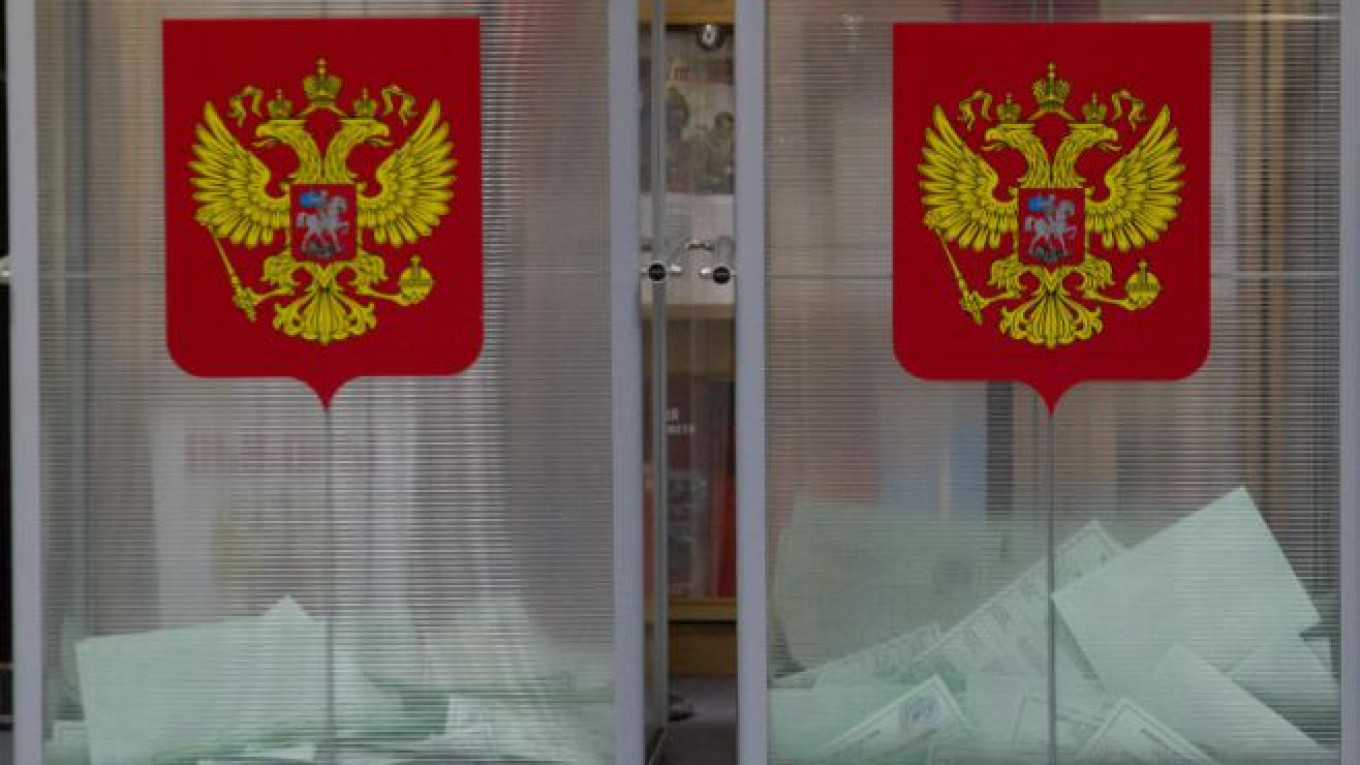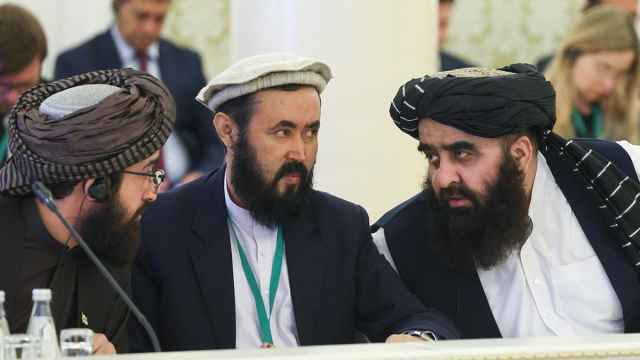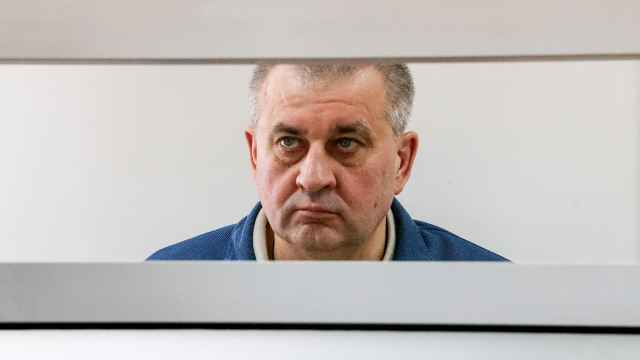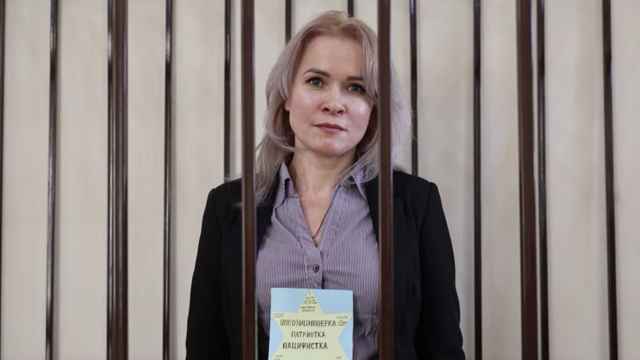A wave of dawn raids was carried out Tuesday at staff homes and the offices of Golos, a respected Russian election-monitoring NGO, as the official campaign against civil society organizations continued unabated.
Moscow regional investigators searched the apartments of two members of the organization's council, Grigory Melkonyants and Roman Udot, as well as the home of the NGO's executive director Tatyana Troinova, Golos said in a statement.
Law enforcement officers seized computers and memory cards at Melkonyants' apartment before moving their search to Golos' office in central Moscow, the statement said. The organization's lawyer Olga Gnezdilova told Interfax that the aim of the searches was to paralyze the organization's work, and said Golos would file a complaint over the searches in court.
The elections monitor has been a thorn in the side of the authorities for more than a decade, training thousands of observers who have gone on to help expose multiple violations during electoral campaigns.
During the 2011 State Duma elections, Golos played a key role in recording and revealing major violations that sparked mass protests in major Russian cities, drawing enraged criticism of the organization from government officials and state-run media.
Taxes or Warning?
The latest searches were connected to a long-standing tax evasion case against Golos' sister organization in the Samara region, Gnezdilova told Interfax.
In 2010-12, Golos received 11.9 million rubles ($207,400) in grants from the United States Agency for International Development to observe Russian elections. The Federal Tax Service said that the funds should be qualified as taxable income because they financed work pursued "in U.S. interests," Vedomosti newspaper reported in April.
According to Golos, it did not agree with the tax collectors, but paid the taxes anyway. It then donated some of the remaining money to its sister organization in Samara, where it was deemed eligible for tax once again. Golos appealed the decision in court but lost its case, and subsequently refused to pay tax on the money a second time. In March a local court ordered the seizure of assets belonging to Lyudmila Kuzmina, Golos' head in Samara: a 37-square-meter apartment and a 12-year-old car.
Andrei Buzin, another member of the Moscow organization's council and one of the most prominent Russian election observers, said the Moscow Golos has no legal affiliation with the Samara organization and that there were therefore no solid grounds to conduct the searches in connection with the tax case.
"I think this is connected with the upcoming elections in September. Qualified observers can prove the incompetence of electoral commissions," Buzin said in a phone interview Tuesday.
Russia is due to hold several regional and municipal elections on Sept. 13.
"At the same time, it is clear that the attacks have also intensified due to Russia's confrontation with the West: There is a constant search for internal enemies in the country," he said.
First Foreign Agent
The crackdown on Russia's NGOs was launched in 2012 when President Vladimir Putin signed the so-called foreign agents law that requires all NGOs receiving funding from abroad and engaged in loosely defined political activity to register as foreign agents, a term widely associated with spying in Russia.
Founded in 2000, Golos — whose name translates as "voice" or "vote" — became the first organization to be forcibly declared a foreign agent in 2013. That same year, the Kremlin made what some analysts said was an attempt to co-opt Golos by giving it a presidential grant. The organization has battled to be removed from the foreign agents list, arguing that it no longer receives any funding from abroad, but so far its efforts have been unsuccessful.
While the bid for control of Russia's NGOs was launched back in 2012, the campaign was greatly intensified following the protests in Kiev that deposed former Ukrainian President Viktor Yanukovych from power last February.
According to Sergei Markov, a pro-Kremlin political analyst and former State Duma deputy, the Ukraine crisis has forced the Russian government to be more active in cracking down on NGOs.
"There is no doubt that Russian people want the government to prevent any attempts to repeat the Ukraine scenario in Russia," Markov said in a phone interview.
"Today there is a presumption of guilt about all organizations that have cooperated with the U.S. government or the American establishment," he said.
Here to Stay
Speaking at an expanded meeting of the country's Security Council on Friday, Putin warned that "we cannot hope that some of our geopolitical opponents will change their hostile course at any time in the foreseeable future."
Putin has repeatedly suggested that the so-called color revolutions that have brought about regime change in former Soviet states were fomented by Western governments that manipulated local public opinion via complicit NGOs.
Ivan Pavlov, a prominent human rights lawyer, agreed that the government has become much more aggressive toward civil society following the outbreak of the Ukraine crisis. But he said that this was not driven by national interests, but by the desire to keep the ruling elite in power.
"Against the background of what was happening in Ukraine, representatives of the Russian government have taken their feet off the brakes," Pavlov said in a phone interview.
"It seems they have no constraints anymore," he said.
Contact the author at i.nechepurenko@imedia.ru
A Message from The Moscow Times:
Dear readers,
We are facing unprecedented challenges. Russia's Prosecutor General's Office has designated The Moscow Times as an "undesirable" organization, criminalizing our work and putting our staff at risk of prosecution. This follows our earlier unjust labeling as a "foreign agent."
These actions are direct attempts to silence independent journalism in Russia. The authorities claim our work "discredits the decisions of the Russian leadership." We see things differently: we strive to provide accurate, unbiased reporting on Russia.
We, the journalists of The Moscow Times, refuse to be silenced. But to continue our work, we need your help.
Your support, no matter how small, makes a world of difference. If you can, please support us monthly starting from just $2. It's quick to set up, and every contribution makes a significant impact.
By supporting The Moscow Times, you're defending open, independent journalism in the face of repression. Thank you for standing with us.
Remind me later.






